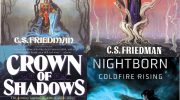 Anthony Pryor, Role playing game legend is here to tell us about his The Shepherd trilogy. Book one of the trilogy, She who watches already has the critics turning their heads and taking notice. For SFFWorld readers and RPG lovers alike, let’s find out why.
Anthony Pryor, Role playing game legend is here to tell us about his The Shepherd trilogy. Book one of the trilogy, She who watches already has the critics turning their heads and taking notice. For SFFWorld readers and RPG lovers alike, let’s find out why.
I would like to thank you for taking the time to answer a few questions. First, I would like to ask you a little about yourself and let everyone find out a little more about you in general. Like where you are from, and what occupies your time when you are not writing?
Hi, and thanks so much for the awesome intro (and yes, I have frequently been called a legend in my own mind). I was born in Carmel, California but these days I’m from Milwaukie, Oregon (not to be confused with Milwaukee, Wisconsin, which I understand is actually pronounced “mill-e-wah-que” and is Algonquin for “the good land”). By day I work in IT, which I’m sure surprises no one, and I also have the expected nerd hobbies – games of all sorts, reading history and lots of genre fiction, model building, watching bad (and occasionally good) movies, kayaking and playing bass guitar with all the finesse of a tree sloth. And oh yeah… I also write fiction and roleplaying stuff when I can find the time.
I am enthralled so far with what I have read in book one, She who watches. For our reader could you tell us a little about The Shepherd trilogy?
Thanks! I’m glad you’re enjoying it. The Shepherd is my take on the “chosen one” story, in which an individual is faced by a greater destiny and has to decide whether to accept or reject it. In that, it’s the kind of story that’s been told for a very long time, up to contemporary tales like The Matrix and Buffy the Vampire Slayer. I wanted to play with the trope a little, following my hero, investigative journalist Alex St. John on his journey from somewhat cynical and misanthropic rationalist to the earthly champion of a goddess, charged with defending our reality from forces that want to invade or destroy it.
Alex is aided in his mission by a motley crew of supporting characters, including Annabelle Lee Moore, who bears her own mysterious destiny, kukri-wielding avenger Mia Jordan, fellow journalist and all-around nerd Loren Hodges (a fan favorite, if readers are to be believed) and Loren’s faithful dog Beowulf, whom I consider the most even-tempered and sensible character in the entire series.
In the first book, She Who Watches, Alex investigates a horrifying but seemingly mundane string of serial killings, only to find that they are actually part of a pattern stretching back centuries, involving the being called Onatochee, a banished alien deity determined to return to our world. Only by accepting his destiny and a sword from the hand of a mysterious goddess can Alex hope to stop Onatochee and its cult.
In the second volume, Wings of the Fallen, Alex is struggling with his status as the Shepherd, guardian of our reality. He and Loren are caught in the middle of an ancient war between a band of fallen demons and the god known to the Sumerians as Mimma-Lemnu (“All That is Evil”). The key to solving the mystery and once more saving reality lies with Annabelle Moore, as well as eastern Oregon rancher Frank Magruder and a seemingly immortal billionaire known as Roger Dandridge. The fate of two realities is decided in a massive battle on an alien world, which really should be read while listening to Judas Priest or Metallica.
In the final volume, A Shadow in the Deep, Alex and his companions are separated across time and space, forced to face the sentient ocean called Tul’xatash and its monstrous servants. Alex must survive in a devastated, drowned world of the future while Loren, Anna and their new companion Mia Jordan desperately search for a way to rescue their friend, even if it means forging an alliance with some of their greatest enemies.
Whew. Sorry – hope I didn’t go on too long there.
 How has your past work in the RPG world influenced the work you have done on The Shepherd trilogy?
How has your past work in the RPG world influenced the work you have done on The Shepherd trilogy?
I doubt I could have done any of this without my RPG work. On a purely practical level, my time in the industry taught me how to write to deadline within tight word-count limitations to produce spare, informative prose that is exciting and readable without being burdened with unnecessary verbal baggage. It was also a great experience to work with editors and developers, and to be an editor/developer myself, as it showed me the process from both sides, and helped me to understand the work that editors do. I try to be very nice to editors – they have a tough job.
On a creative side, it was simply liberating to be able to tell stories, or develop worlds and settings, and to work collaboratively with others who were doing the same. Writing in an established setting requires a certain level of knowledge of the world, and hones research skills (believe me, researching an adventure or sourcebook for D&D’s Forgotten Realms sometimes feels just as challenging as working on a novel about Restoration-era England), while creating a new setting or world, as I and fellow writers helped do with White Wolf’s Scarred Lands series, is a rewarding exercise in letting your mind run free and in collaborative storytelling.
In your article for Permuted Press, you mention that The Shepherd trilogy is a tribute to Robert E. Howard and HP Lovecraft as being sources of inspiration. In what way do you feel this inspiration has helped you create The Shepherd trilogy?
On the surface Howard and Lovecraft couldn’t have been more different. One was a quiet, intellectual writer with a fondness for the trappings of civilization who penned stories of deep cosmic horror and madness, while the other fancied himself more of a natural man who wrote bloody tales of adventure and embraced the notion that barbarism was mankind’s natural state. Yet I also see them as sides of the same coin – both saw the universe as a dark and comfortless place, where the gods and forces of nature were at best indifferent and at worst actively hostile, but each approached this grim universe from a different perspective. This nihilistic cosmos drove many of Lovecraft’s heroes mad, while on the other hand Howard’s characters preferred to go down fighting, sword in hand, taking as many foes with them as possible.
While we must acknowledge the unsavory qualities of both authors’ tales – steeped as they were in the unpleasant social views of their time – their influence cannot be ignored even today, decades after their deaths. The unnamable terrors of Lovecraft and the bloody nihilism of Howard both continue to influence horror and fantasy writing, with Conan comic books sitting on shelves beside plush Cthulhu dolls (the latter of which would surely have horrified the gentleman from Providence). And the concepts of “cosmic horror” and “swords and sorcery” are both indelibly inscribed in our collective intellects. Few indeed are the authors who can be credited with creating an entire genre of fiction.
Though the Shepherd series draws great inspiration from the horror, heroism, darkness and violence of both men’s fiction, I don’t view my own work as a pastiche or retelling, but rather as my own personal take on HPL and Howard, from a more modern perspective, hopefully with a slightly less grim view of the universe. Yes, as humans we must face horror and the possibility of our own extinction as utterly insignificant beings. But I believe that if we face those truths bravely, with intellect, kindness and loyalty, together we can create our own reality that matters to us and those we love. And if we can do that, who gives a damn whether the vast, cold cosmos cares or not?
I don’t mean to get too terribly serious, either. In the end, I’m writing purely to entertain – any “message” that my work imparts is just gravy, but if a reader finds something positive amid all the mayhem, then I’m going to be a very happy camper.
You have been a published role playing game developer for countless games; could you tell us what the difference is with publishing a novel vs. publishing for RPG’s? Which would you say offer more creative control?
Writing for RPGs is a lot like writing in an established media universe, as when authors like Steve Perry or K.W. Jeter write Star Wars or Conan novels. You have a degree of freedom and can express your creativity all you want, but there are legions of players and fans who probably know the setting better than you do, so you need to tread carefully and stay within established canon. Original novels of course provide a lot more creative freedom, and you’re free to make or break canon as you choose.
Mind you, playing in someone else’s yard has its rewards, in that while you’re constrained by the setting and its pre-established limitations, you can explore within those boundaries, and maybe even develop something new. Adding to the canon of a setting like the Forgotten Realms is very rewarding, and I’m actually quite pleased when other people take my work and run with it, so the fun of collaborative creation can compensate for the lack of absolute control.
While reading She who watches, I really enjoyed the style of writing. Why did you choose to tell the story with a first person narrative?
For some reason first person comes more easily to me. From time to time I’ve heard the advice from well-meaning and talented writers and instructors that you should never write in first person (or open a story with dialog, or write prologues, etc., etc.), but I say fie on that and all the other “never” and “always” advice you get. If it works, do it, and if it’s comfortable to you, don’t hesitate.
I like first person because it has a more personal feel to me, and lets me get farther into the narrator’s head. It also allows for a little bit of fourth wall breaking, which I don’t do in The Shepherd, but I often enjoy when other folks like Jim Butcher do it, allowing the narrator to occasionally talk to the reader directly. Of course, I also write in third person, and in A Shadow in the Deep I actually alternate between first and third person. That is not something I see done very often — J.A. Pitts does it quite effectively in his excellent Sarah Beauhall novels for example — but I really like it, and I will probably keep experimenting with future works.
Permuted Press is releasing The Shepherd trilogy, have you worked with them in the past? Could you share a little about the experience?
This is my first experience with Permuted Press, and it’s been a thoroughly painless and enjoyable experience. As they are particularly interested in new authors (despite all my work in the RPG world I’m basically a babe in the woods when it comes to fiction) and series, they proved a perfect fit for me. My literary agent Kimberley Cameron has also been a huge asset and great to work with, so between these two professional entities I feel that I’m in excellent company.
Permuted is an amazing publisher — their catalog is nothing short of huge, and recently they’ve begun to move to diversify the releases, including some more varied works of horror and suspense beyond the undead novels that they originally specialized in. With such a big catalog, they have the publication process down to a science, efficiently moving through the editorial and pre-press routine and producing books on what seems to me like an almost insane schedule. My only fear is being lost in the rush alongside all these other terrific books, but I’m hoping that The Shepherd will hold its own.
What motivated you to switch from role playing game developer to novelist?
I think every game designer is a frustrated novelist, and I’ve been writing fiction all my life. I’ve had a handful of short stories published, but the vast majority of my stuff has been for RPGs, from Battletech to Pathfinder with many stops in between. In the past I don’t think that I approached fiction with quite the same work ethic as game writing, possibly because I wasn’t being paid and didn’t have an ironclad contract stating that I had to deliver a product by such-and-such a date.
I have written, I’d say 9-10 full length novels, but I didn’t get truly serious about selling them until a few years ago. I wrote a novel, sent it out and failed to sell it or obtain representation. In the past that would simply have led to another hiatus when I focused on game writing, but this time I didn’t let grass grow under my feet – I wrote another and did the same thing, then I wrote another and did the same thing, etc. and when I was on the verge of giving up entirely I finally got an awesome agent (Kimberley Cameron, see above), and within a matter of months we had a sale. This hasn’t dampened my enthusiasm for game writing at all, as I’m still doing work for Frog God Games in Washington, and I’m still dabbling with my own stuff, but at least now I can see the fiction writing as a potentially paying gig, just like game writing.
My panel of role playing gamers has requested that I ask a few questions on their behalf. First, related to The Shepherd trilogy, do you have plans to release a role playing game in this setting?
This has certainly crossed my mind, and given my history it’s really a natural progression. My thinking right now is that it might make a good supplement or setting for an existing rpg system such as Savage Worlds or Apocalypse Engine, but despite my enthusiasm it would still be a daunting task. Given the sheer size of such a project I’d probably have to get some help on it, but fortunately I know a lot of absolutely kickass designers who would probably be happy to participate. Keep your ears open.
I have heard a lot of gamers complaining that the games of today lack strong stories. Do you have any thoughts on the subject?
I think it largely depends on the game, but to some extent the malign influence of video games (I kid! I kid! I love video games!) has seeped into roleplaying, in that many console and video games emphasize multiplayer aspects at the expense of story. I’m one of those guys who plays games like Halo for the story, which I find very compelling, but I’ve noticed that in some franchises the single-player campaign seems less and less complex and interesting. I’m also not a huge fan of roleplaying campaigns in which the adventures are more or less standalone locations or quests that are only minimally tied together.
But take heart — there are still games with great stories — video games like The Witcher, rpgs like Night Witches and roleplaying campaigns like Zeitgeist that are great antidotes to dreary or nonexistent storytelling. Don’t get me wrong – I love video games in which all you do is run around and blow stuff up (I enjoy World of Tanks, even if I spend most of my time there being humiliated by 12-year-olds), and old-school roleplaying that just involves bashing monsters in a dungeon, but I think that in this day and age we should have the choice of story and action, rather than having to decide between one or the other. There are rpgs and video games that give you good stories, but sometimes you have to look for them, or better still, make your own stories with the raw material you’re given.
Out of all of the RPG’s that you have worked on, which one if any was your favorite?
Oh, all of them 🙂 Seriously, every game I worked on had much to recommend it, and it’s hard to pick favorites, but if you twist my arm I’d say that I truly loved helping to create and guide the Scarred Lands back in the ‘00s, especially since I helped some great writers get some deserved recommendation, and also made some great friendships with some wonderful people. Back in the ‘80s and ‘90s I also worked on Bard Games’ Talislanta setting, a world strongly inspired by the works of Jack Vance, and we produced some amazing material that regrettably is now long out of print. The humorous Marco Volo trilogy for Dungeons & Dragons, back in the old TSR/Forgotten Realms days, gave me an opportunity to be creative and silly and also to produce a really enjoyable series of adventures that was very well received. Finally I have to say that the small amount of work I did on Green Ronin’s Song of Ice and Fire rpg was both incredibly fun and terrifying at the same time, since I got to do the writeup of House Stark, the most tragically emo family in Game of Thrones, and if I screwed them up I’d have both the fans and the (truly) legendary George R.R. Martin howling for my blood. Fortunately I haven’t been visited by any crowds with torches and pitchforks for several months now, so I guess it turned out okay.
Do you have any future projects planned that you could tell us about now; novels or RPG?
I’m currently doing some less-than-glamorous but very necessary work for Frog God, converting older adventures to newer rules systems, and I’m hoping to do some more original work as a developer, working with some of my old Scarred Lands crew. I have another novel titled Tenebroso, a supernatural western, making the rounds (not first person this time, but possibly set in the 19th century version of the Shepherd universe – I haven’t decided yet). Other projects are in the planning stage, but they include some more conventional fantasy tales, and a new Shepherd trilogy if all goes well.
I really enjoyed the short stories that you have written for your web site, do you intend to keep writing and posting short stories?
Absolutely. I’m glad you liked them. Short fiction is a very challenging art form – in many ways I think they’re harder than novels, as you have to tell a complete story in a very limited amount of space. I’m interested in possibly spinning Loren Hodges and his dog Beowulf into their own adventures in the Shepherd setting, so that’s a strong possibility. Johnny Diamonds, aka the Grey Ghost, is a pulp villain/hero who I really enjoyed creating and I’d also love to do more of his adventures, possibly collected into a single volume. Right now there are so many choices and so many directions to go I’m going to have to be very selective, lest I go hopelessly mad.
There are many more questions that I would like to ask. Could you tell our readers where they could find out more about you and your work?
Please come over and say hi! My web page (home of the above short fiction, as well as my blog) is atwww.anthonypryor.com, and you can friend me on Facebook or Google+. If you’re the type who likes to express your opinion on stuff (hey, I know you’re out there), feel free to leave some feedback on Amazon, Barnes and Noble and my Goodreads page. I’m also going to be guesting this year at Westercon 69 in Portland, OR over the 4th of July weekend, and I’m hoping to have a table where I can sell my books to legions of eager fans (well, one or two of them at least), so anyone who’s in town is welcome to stop by and chat. How’s that for shameless self-promotion?
With the release of The Shepherd trilogy, is there anyone in particular that you wish to take time out to thank?
There are so many and I’m always afraid I’ll forget someone, but I’ve had a huge amount of help and support over the years, from my mother Elisa and my daughter Devon, both of whom are amazing people, as well as my friends and readers, fellow game writer Rhiannon Louve, and my much beloved Beth Peters. My writer’s group, comprised of me and an incredibly talented group of people – Shawna Reppert, Danielle Myers Gemballa, Rebecca Stefoff, Garth Upshaw and my long-time bestie Dale Smith – provided a huge amount of suggestion, criticism and praise that helped make these stories a lot better. Also, my agent Kimberley Cameron (remember her?) has given me enormous support and guidance. And finally of course thanks are due to Permuted Press for publishing my scribblings, and to great folks like SFFworld and Nerdsonearth.com for their positive reactions and their aid in getting the word out.
Thank you, Anthony Pryor, once again for taking the time. The hardest thing about conducting such a wonderful interview is to stop asking the questions. I truly hope that I get this opportunity again, and maybe sit down in person over a cup of coffee for a solid two or three hours, and discuss Peace, love, and Role play. Best of luck to Anthony Pryor and The Shepherd trilogy, She who watches, Wings of the fallen and A shadow in the deep.
This has been a lot of fun. Thanks again to SFFworld and your readers – I would love to speak to you all again soon. Don’t be a stranger!
*****
Interview by Daniel Abbott – SFFWorld.com © 2016




